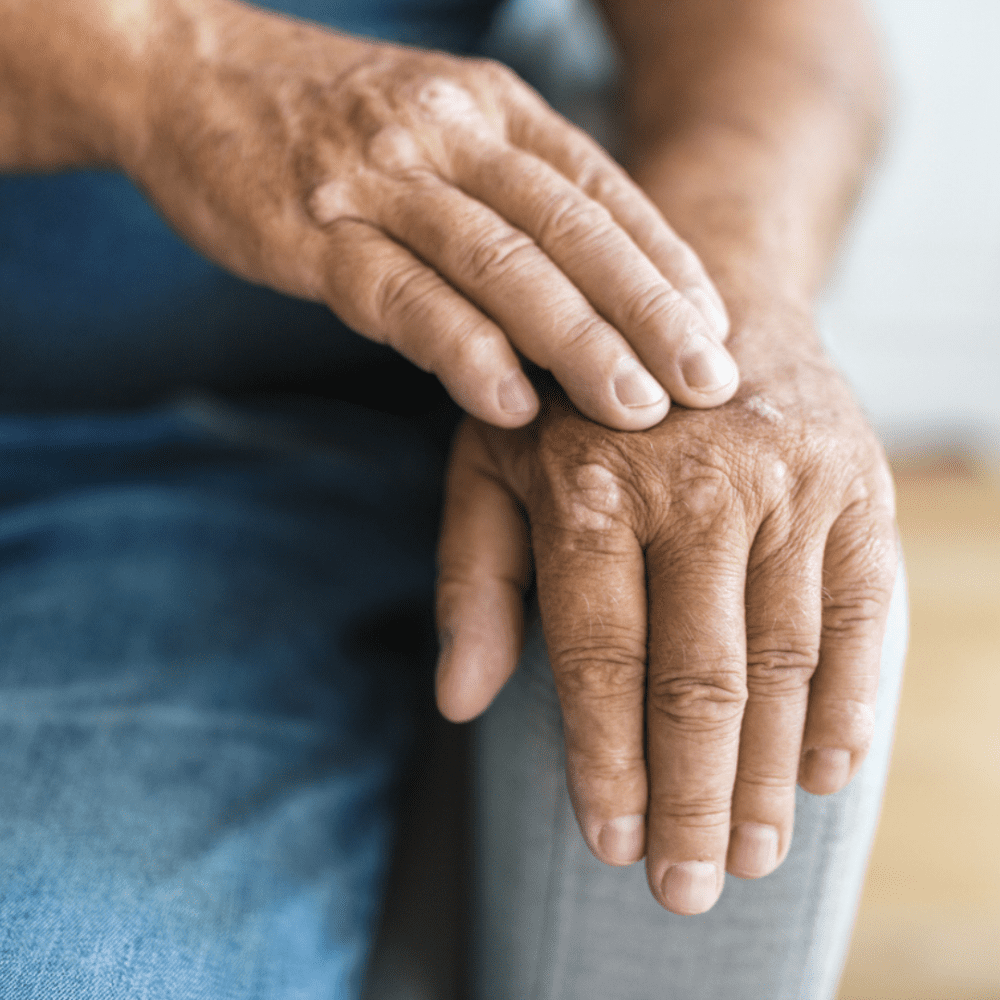
What is psoriatic arthritis?
Psoriatic arthritis is an inflammatory condition that causes pain, stiffness, and swelling in the joints. It primarily affects people with psoriasis, a skin condition characterised by red, scaly patches. While not everyone with psoriasis will develop PsA, about one or two in ten individuals with psoriasis may experience this type of arthritis.

What are the symptoms?
The symptoms of Psoriatic arthritis can vary widely from person to person. Symptoms may develop gradually or appear suddenly and severely. Common signs include:
- Joint Pain and Swelling: Pain, stiffness, and swelling in one or more joints.
- Spinal Pain: Stiffness or discomfort in the lower back, buttocks, or neck (spondylitis).
- Tendon Pain: Discomfort at tendon attachment points, such as the heel or sole.
- Nail Changes: Thickened, discolored nails or nails separating from the skin.
- Eye Inflammation: Redness, pain, or sensitivity to light.
If you’re experiencing these symptoms, speak with your doctor promptly for evaluation and support.
What causes it?
The exact cause of PsA remains unclear, but several factors likely contribute:
Causes
-
Genetics: The HLA-B27 gene is linked to PsA, particularly with spinal involvement. However, many people with this gene never develop the condition.
-
Immune System: PsA may result from an immune system imbalance, though this connection is still under investigation.
-
Genetics: The HLA-B27 gene is linked to PsA, particularly with spinal involvement. However, many people with this gene never develop the condition.
Other Common Questions
Early diagnosis is critical to managing PsA effectively. Your doctor will:
- Assess your symptoms and medical history.
- Examine your skin for signs of psoriasis, if not already diagnosed.
- Perform blood tests to detect inflammation and rule out other forms of arthritis.
If PsA is suspected, your doctor should refer you to a rheumatologist, a specialist in arthritis care.
With the right treatment, most people with psoriatic arthritis can lead full and active lives. However the course of psoriatic arthritis is variable and no two cases are the same. Many people find their symptoms worsen at times (known as a ‘flare’) and then settle down for a period of time. About one in 20 people with psoriatic arthritis will develop a more severe, destructive form which can cause deformity to the joints in the hands and/or feet. Most people with psoriatic arthritis will need some ongoing treatment to control their symptoms and prevent damage to the joints. This is usually managed by a rheumatologist.
Currently there is no cure for psoriatic arthritis. However treatment for psoriatic arthritis has improved dramatically, with new medicines that are extremely helpful in controlling the condition. Be wary of any products or therapies that claim to cure psoriatic arthritis.
Your rheumatologist will tailor your treatment to your symptoms and how severe your condition is. There is no way of predicting exactly which treatment will work best for you.
Your doctor may need to trial several different treatments before finding the one that is right for you and may include medicines, such as:
- non-steroidal anti-inflammatory drugs (NSAIDs)
- disease-modifying anti-rheumatic drugs (DMARDs)
- biological DMARDs.
For more information see the Australian Rheumatology Association’s Patient Medicine Information or the Medicines & Arthritis information sheet.
See a rheumatologist as early as possible.
A rheumatologist can diagnose psoriatic arthritis and make sure you get the right treatment to help your symptoms and prevent future problems. If you have psoriatic arthritis and have not seen a rheumatologist, ask your doctor to consider referring you. See the Working with your healthcare team information sheet.
Learn about PsA and play an active role in your treatment.
Not all information you read or hear about is trustworthy so always talk to your doctor or healthcare team about treatments you are thinking about trying. Self management courses aim to help you develop skills to be actively involved in your healthcare. Contact your local The Arthritis Movement on 1300 275 826 for information.
Learn ways to manage pain.
See the Dealing with Pain information sheet.
Live a healthy life.
- Eat Well: A balanced diet rich in fruits, vegetables, and healthy fats supports overall health.
- Quit Smoking: Smoking can worsen inflammation and symptoms.
- Manage Stress: Practice relaxation techniques to reduce the impact of stress on your symptoms.
Learn how to protect your joints and cope with tiredness.
See the Fatigue & Arthritis information sheet.
Acknowledge your feelings and seek support.
As there is currently no cure for psoriatic arthritis, it is natural to feel scared, frustrated, sad and sometimes angry. Be aware of these feelings and get help if they start affecting your daily life. See the Emotional Wellbeing information sheet.

MyPsA by Arthritis Australia
MyPsA aims to help you understand psoriatic arthritis (PsA), how to manage it and where to access support.
MyPsA has been developed with experts and people living with PsA, to empower you with the knowledge to help you live a better life with PsA.
Register with MyPsA and answer a few simple questions to receive information, articles and videos recommended for you.




